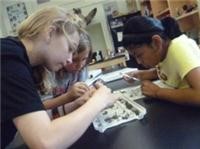Multiple Intelligences Newsletter, Vol 28, No 2
September 1, 2018
Greetings MI Fans,
I hope your school year has started off well and that you’ve been creating opportunities for your students to learn through all of their intelligences. “All” is a big word, so perhaps you begin by working to fit one non-scholastic intelligence into your teaching. How might you incorporate the spatial intelligence – art, drawing, maps, design – into your curriculum and instruction, for example? Or what about the musical intelligence? How can music help us understand culture and history? How does mathematics relate to music?

Trying is what’s important. You’ll make mistakes, and that’s OK. After all, we learn from our mistakes! What’s important is that you – we – try. And you know that in your efforts to use MI, you are working to help kids learn.
Many teachers and principals were good students. They learned a lot and did what was expected. Chances are that these folks – probably you! – had strengths in the scholastic intelligences, linguistic and logical-mathematical. People often go into teaching because they liked school; they did well. (And for most of us, we teach in the way that we learned, and that is not likely to support using MI.)
But in all classes there are students who have strengths in other intelligences. They may be strong in art, music, physical education, or the outdoors; they may know themselves or work especially well with others. An MI approach to curriculum and instruction enables these children to use their stronger intelligences, so they will learn more. Too, the kids who learn in this way will be encouraged, and will then approach traditional instruction in a more motivated way. So if you’re a scholastic learner, step out of your comfort zone and work to allow students to learn in other ways. They’ll love it!
This issue features an article from The Chronicle of Higher Education by Howard Gardner. But it’s not about MI. Rather, Gardner shares his thoughts about the value of philosophy courses in higher education (of course, philosophy is intrapersonal and interpersonal focused). As always, Gardner’s thoughts are thoughtful and thought-provoking!
